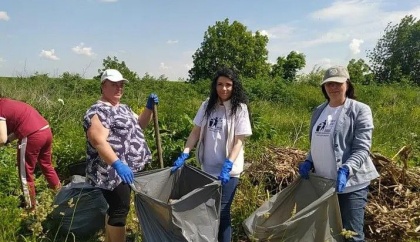
This is how the Docudays UA Film Club “Law in the Lens” at the Khmelnytskyi Regional Library helps the communities of the region unite and solve their urgent problems.
Reprinted from the Sheriffs for New Communities Information Platform.
The Chemerovets community in the Khmelnytskyi region was plagued by spontaneous garbage dumps. Cleanup efforts were ineffective – the dumps were growing like mushrooms. To prevent this, the local authorities even purchased containers for separate solid waste collection, but people stubbornly ignored them. Only 2% of residents sorted their waste, and the rest had neither the motivation nor the desire to support this idea. That is, until the “Law in the Lens” Film Club at the regional library took up the challenge. The moderator of the film club, Zoya Filipenko, decided that the main efforts should be focused on educational activities.
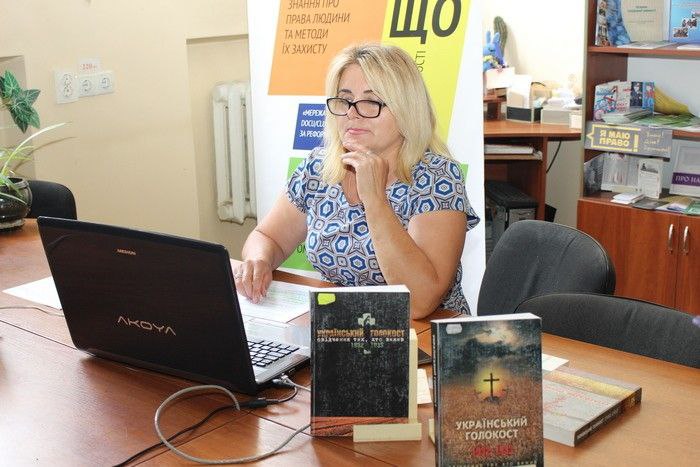
Zoya Filipenko, moderator of the Docudays UA Film Club at the Khmelnytskyi Regional Universal Scientific Library
“Save the Environment – Sort the Waste”
This is the title of the advocacy campaign initiated by Zoya Filipenko in the Chemerovets community. With it, the film club team won the DOCU/ACTS competition organized by the DOCU/CLUB Network in 2021. For the local authorities, teaching people to sort garbage turned out to be, without exaggeration, a monumental task. Apparently, buying containers for separate solid waste collection was not enough. People still needed explanations on how and why to do it. However, the Chemerovets community's environmental program did not mention this.
“I looked at it, and there was only one section: planting greenery, cleaning up illegal dumps – and that was it. There was no information and education section at all. So we started working on this,” says Zoya Filipenko. “At first, we held an organizational meeting of stakeholders, inviting representatives of the authorities. They agreed that the program should include a paragraph on training and educating the population. They also worked together to develop a large series of events that involved schools, all the libraries in the Chemerovets area, and even condominiums. Finally, together with residents and activists, they initiated the expansion of the environmental protection program so that the issue of waste sorting was included in community development plans and money was allocated from the budget.”
Ambassadors of clean roadsides
Documentary cinema helped convince people of the necessity of waste sorting. The “Law in the Lens” film club organized screenings of documentaries from the DOCU/CLUB Network collection. “I showed ‘E-Wasteland’ by Australian director David Fedele or ‘Gabriel Reports on the World Cup’ by Dutch director Els van Driel. People had never seen such films before. And when we started showing them in the Chemerovets district, people said: these films tell about the same problems we have. It turns out that illegal landfills are a problem not only for the Chemerovets community, but also for the world. Then we had ambassadors – not only young people, but also people of respectable age – who said: let us tell you how to sort garbage on our street. So the work started,” recalls the film club moderator.
Activists of the NGO “Active Citizens of Chemerovets” and the head of the Chemerovets Central Library, Maria Kulpinska, took up the cause on the spot. Moreover, thanks to their efforts, the advocacy campaign is actually still going on. The library continues to operate an environmental playground: it teaches visitors how to sort garbage and make souvenirs from plastic bottles.
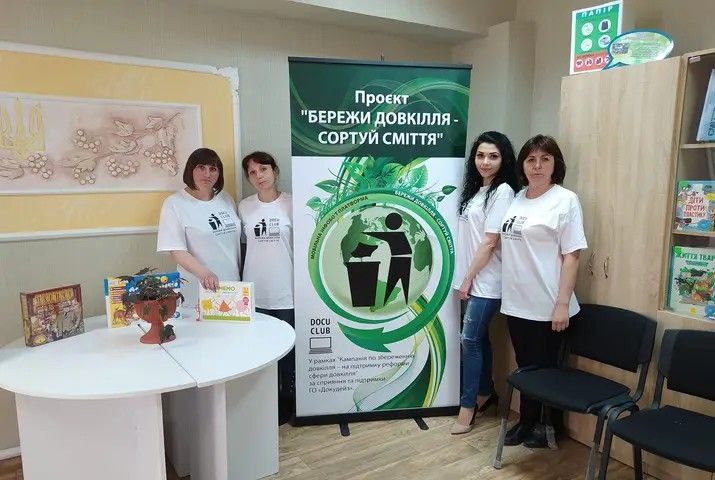
Eco-corner at the Chemerovets Central Library
The community has also started to develop eco-production: they sew eco-bags, make eco-products, and grow vegetables for the Armed Forces. And most importantly, the community has forgotten about the illegal dumps problem. The local budget allocated money for the purchase of equipment, and last year, they bought a garbage truck.
“People are no longer waiting for someone to solve their problems, but are taking things into their own hands, and this is the secret of success,” says Zoya Filipenko. “I remember Maria Kulpinska calling me and saying that they had found a spontaneous dump, so she gathered people and went to clean it up. The authorities told them: we didn't plan to do anything there. To which the people replied: you didn't plan it, but we saw it and are already doing it. I am convinced that the best results can be achieved where there is mutual understanding between the authorities and the citizens. A community is successful when the authorities respond to people's requests and look for solutions to problems,” emphasizes the film club moderator.
“Law in the Lens”
The film club at the Khmelnytskyi Regional Universal Scientific Library has been operating for 7 years. “We decided that we could study human rights through the lens of a film camera. We chose the name for the film club together,” recalls Zoya Filipenko. Already in 2020, her brainchild was among the 15 most active Docudays UA film clubs – and this was the year when the coronavirus pandemic put the entire world on hold! The moderator decided to turn the global challenge into an opportunity: the screenings not only continued, but also became even more numerous, thanks to the online tools.
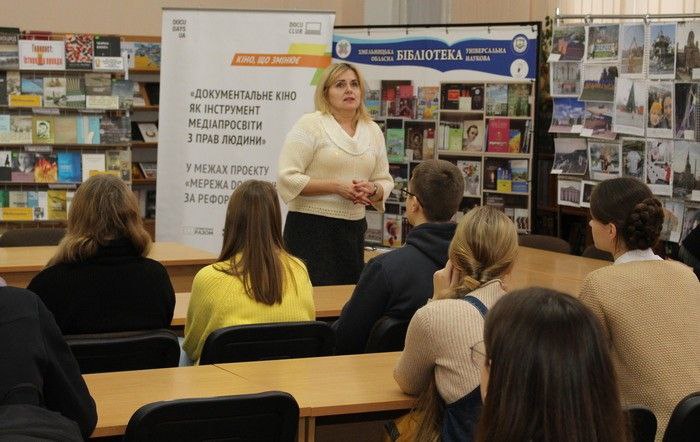
Meeting of the “Law in the Lens” Docudays UA Film Club
“I was one of the first to switch to online screenings. I remember it was June 1. I’d got in touch with the Lisovohrynivka territorial community, and we met for an online discussion. It was the film ‘Difficult One,’ directed by Mykola Bondarchuk and Dmytro Tyazhlov, which tells about an orphanage and its children. We watched the movie with students from a local school, and they actively participated in the discussion. This is when I realized that online screenings should continue and expand from the city to territorial communities (we already had sixty of them in our region). I realized that there is potential for work – as long as one has enough time. By the way, the Volochysk and Chemerovets territorial communities have already founded their own film clubs,” Zoya Filipenko shares her success stories.
The right to life? No, the right to a decent life
Meanwhile, “Law in the Lens” continues its educational mission. Moreover, thanks to the online platform, the film club has expanded its activities to the entire region and is now a platform for discussing and solving problems in many communities. I asked Zoya Filipenko what films are most popular. She says that students like watching motivational films about ways to success, although films about current issues, such as bullying or Internet addiction, are no less popular. Viewers often ask to watch films about Euromaidan and the ongoing war. “We talk to them about the war, about the violation of our rights by racists, about volunteering. We watch films and share our stories. I think I've screened ‘Liturgy of Anti-Tank Obstacles’ by Dmytro Sukholytkyi-Sobchuk about sculptors who produce anti-tank ‘hedgehogs’ about 10 times this year. The audience is very interested,” says Zoya Filipenko.
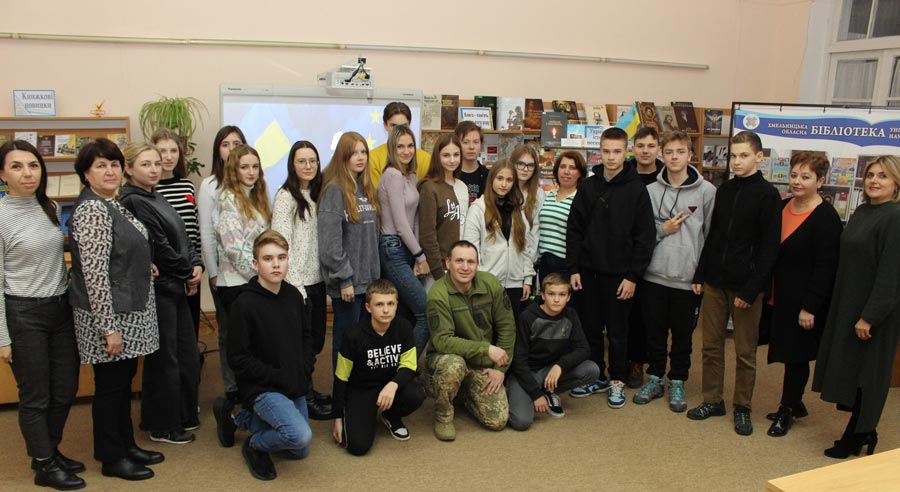
With the film club participants after a discussion of the film
“Every screening involves a discussion, and not always a predictable one. Especially when it comes to such important topics as civil rights and freedoms,” admits the moderator. “During the discussion of films, we often talk about violations of the right to life. And the audience responds that the right to a decent life, or to proper education, or to affordable healthcare is also being violated in our country. I urge the audience to report violations of their right to a decent life. Not being silent about it is the first and most important step.”
Zoya Filipenko has seen how people dare to take their first step towards change after a film club meeting. She tells about a case when a girl from Volochysk, after watching the film “And Every River” by Olesya Morgunets-Isaenko, came to an NGO and offered to clean up the local river. Or, after watching the aforementioned film “Difficult One,” a child initiated a community study of the needs of families in difficult life circumstances to help them with clothing and heating. Zoya Filipenko is convinced that such small steps are the beginning of big changes and a truly decent life.
The development of the DOCU/CLUB Network is funded by the United States Agency for International Development (USAID), the Embassy of Sweden in Ukraine, the National Endowment for Democracy (NED) and Fondation de France.
The opinions, conclusions, or recommendations are those of the authors and compilers of this publication and do not necessarily reflect the views of the governments or charitable organizations of these countries. The authors and compilers are solely responsible for the content of this publication.
All news


